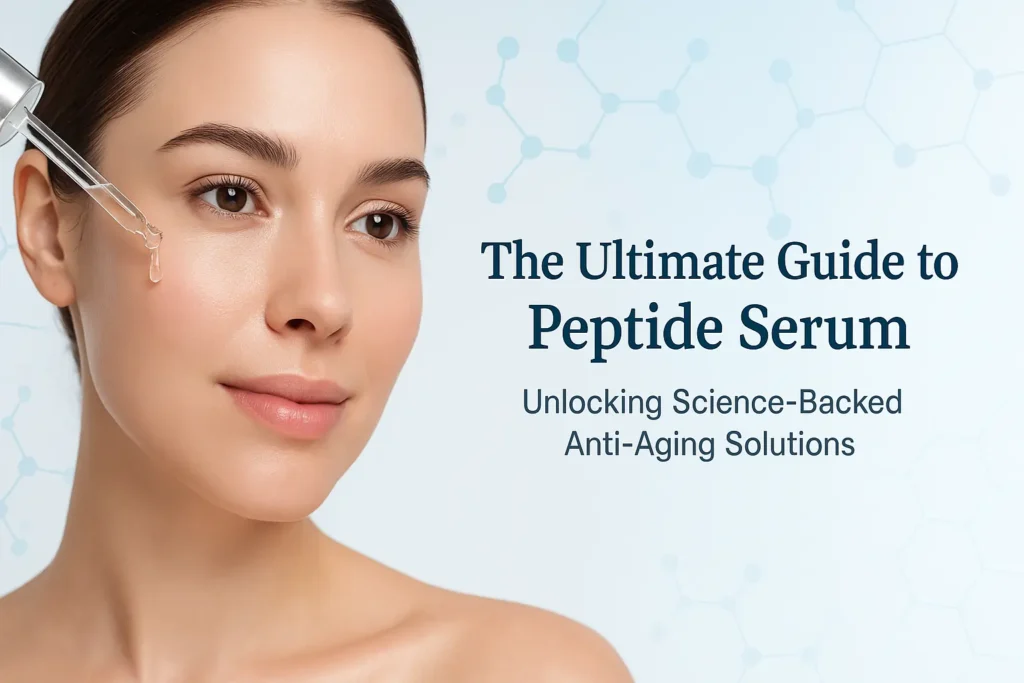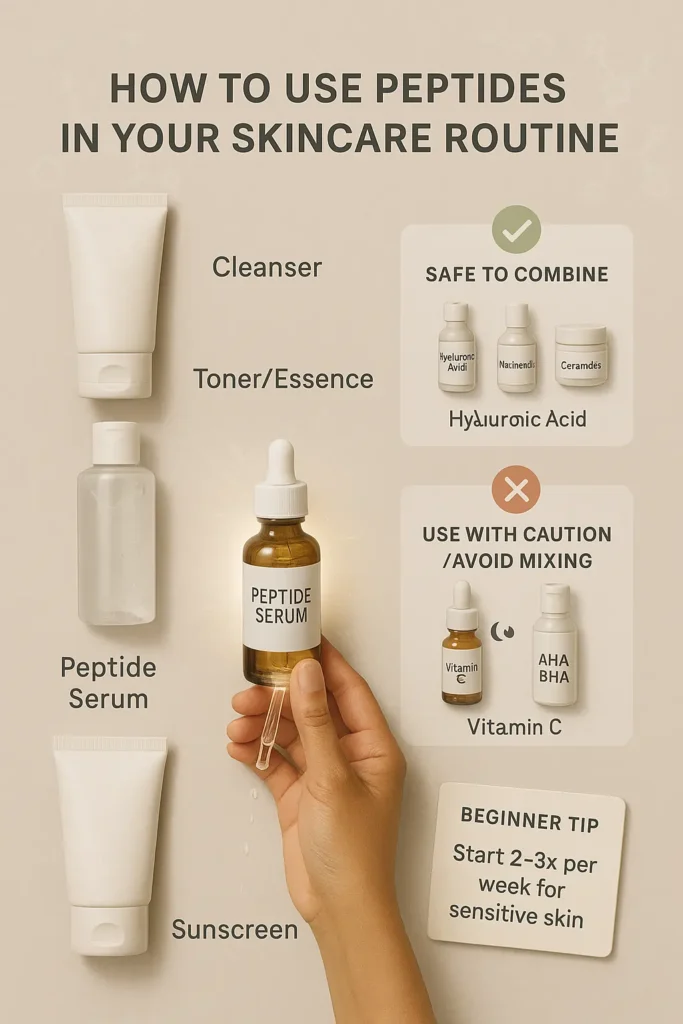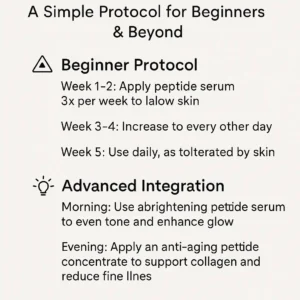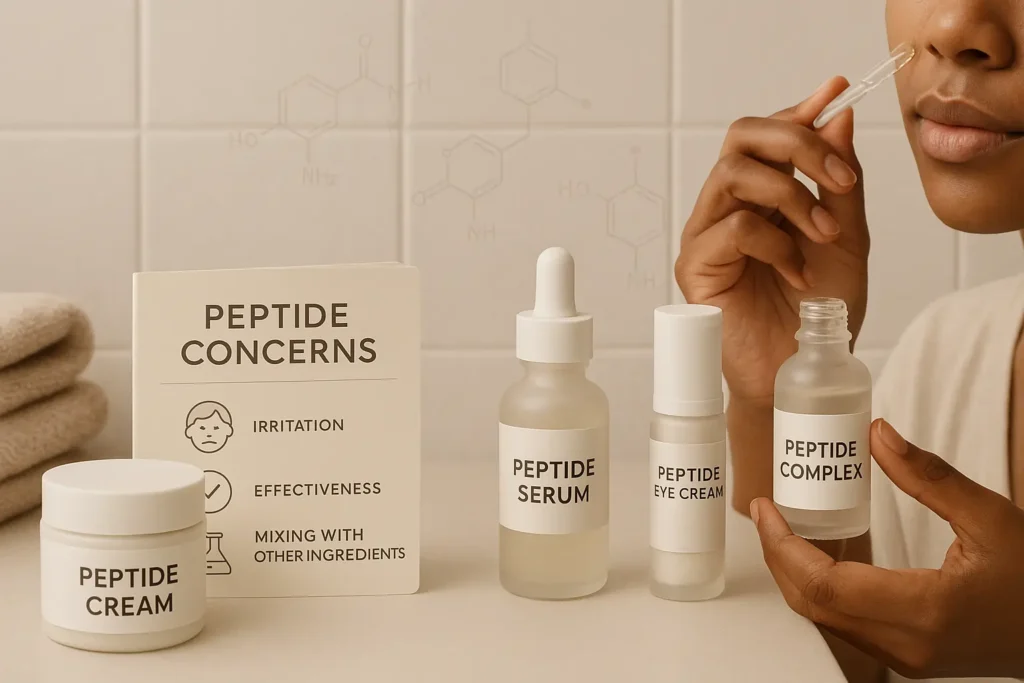The Ultimate Guide to Peptide Serum: Unlocking Science-Backed Anti-Aging Solutions
Welcome to the ultimate guide to peptide serum—your comprehensive roadmap to understanding skincare’s most scientifically advanced anti-aging solution. Think of peptide serums as your skin’s personal repair crew, working tirelessly to rebuild, restore, and rejuvenate from within.
With over 18 years of hands-on experience in clinical skincare innovation and cosmetic product testing, I have witnessed the remarkable evolution of peptide serums firsthand. This guide reflects my extensive research, clinical observations, and practical expertise to help you unlock science-backed, effective anti-aging solutions.
Whether you’re dealing with fine lines, loss of firmness, or simply want to prevent future aging, this guide will equip you with the knowledge to choose, apply, and maximize the benefits of peptide serums for lasting results.
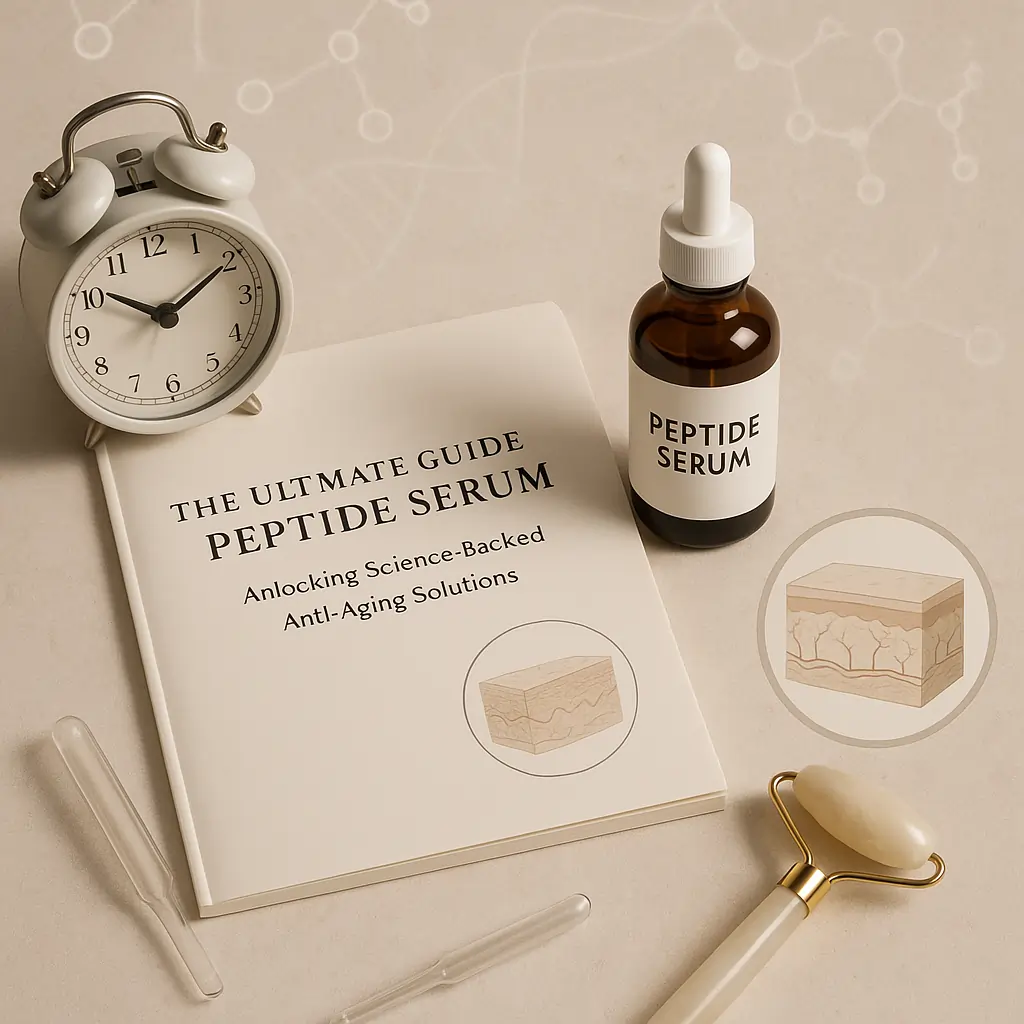
What Are Peptides in Skincare?
Peptides are short chains of amino acids that act as building blocks for proteins like collagen, elastin, and keratin. In skincare, these bioactive compounds serve as messengers, signaling the skin to produce more collagen, repair damage, and maintain its youthful appearance.
During my years of clinical practice, I’ve observed how different skin types respond to peptide treatments. What fascinates me most is their ability to work at the cellular level—essentially teaching your skin to behave like younger skin again.
What Makes a Serum Vegan, Cruelty-Free, and Clean Beauty?
A vegan peptide serum contains only plant-based or synthetically derived peptides without any animal-derived ingredients or byproducts. Cruelty-free means the product is never tested on animals. Clean beauty indicates formulations free from parabens, sulfates, artificial fragrances, and other irritants.
In recent years, vegan and cruelty-free peptide serums have surged in popularity as more consumers prioritize ethical, clean, and environmentally conscious ingredients.
By choosing vegan peptide serums, you’re embracing practical anti-aging science with a compassionate touch, ideal for sensitive skin and those seeking sustainable skincare options.
The Science Behind Anti-Aging Peptide Serums
How Peptides Combat Aging?
Signal Peptides communicate with skin cells to boost collagen production. Popular examples include:
- Matrixyl 3000 (Palmitoyl Pentapeptide-4): Stimulates collagen synthesis
- Argireline (Acetyl Hexapeptide-8): Reduces muscle contractions that cause expression lines
Carrier Peptides deliver essential minerals, such as copper, to skin cells, promoting healing and regeneration. The renowned GHK-Cu (Copper Tripeptide-1) exemplifies this category.
Neurotransmitter Peptides like Syn-Ake mimic the effects of snake venom, temporarily relaxing facial muscles to smooth fine lines—think of it as “the next best thing to a needle” for non-invasive wrinkle reduction.
Clinical Evidence
My experience aligns with research showing that peptide serums can improve skin firmness by up to 20% and reduce fine line depth by 15-30% within 8-12 weeks of consistent use. However, patience is key—peptides work gradually, building results over time rather than providing instant gratification.
Why Choose a Vegan, Cruelty-Free, and Clean Peptide Serum?
Vegan peptide serums offer all the rejuvenating benefits of traditional peptides while aligning with ethical values. They contain plant-based or lab-synthesized peptides with no animal cruelty involved, plus formulations free from harsh chemicals and synthetic irritants.
This makes them perfect for:
-
Sensitive skin types needing fragrance-free, non-toxic skincare
-
Consumers looking for pregnancy-safe anti-aging solutions without retinol or strong acids
-
Anyone committed to eco-friendly, ethical beauty practices
Recent studies affirm that vegan peptides effectively promote collagen and skin repair without compromising skin health or ethical standards [Goldman Laboratories, 2025].
Best Vegan & Cruelty-Free Peptide Serums for All Skin Types
To help you navigate the market, here is a quick-look comparison of some top-rated vegan and cruelty-free peptide serums suited for various skin types:
| Product Name | Key Peptides | Best For | Vegan | Cruelty-Free | Price Range |
|---|---|---|---|---|---|
| Serum A | Matrixyl 3000, Argireline | All skin Types, Sensitive Skin | Yes | Yes | 40-53$ |
| Serum B | Copper Peptides, Niacinamide | Acne-Prone Skin | Yes | Yes | 150$ |
| Serum C | Oligopeptide-1, Hyaluronic Acid | Dry & Mature Skin | Yes | Yes | 23$ |
Clinical Evidence & Safety of Vegan Peptide Serums
My experience aligns with research showing peptide serums can improve skin firmness by up to 20% and reduce fine line depth by 15-30% within 8-12 weeks of consistent use. Vegan peptide serums specifically tend to have milder formulations, making them excellent choices for sensitive or pregnancy-safe skincare (Nguyen T.Q., Zahr A.S., Kononov T., Ablon G., 2021).
Pregnancy and Lactation Safety
Most vegan peptide serums avoid ingredients contraindicated in pregnancy, such as retinol and some chemical exfoliants. However, copper peptides should be used cautiously during pregnancy, and it’s best to consult with your healthcare provider.
How to Use Peptides in Your Skincare Routine?
Apply vegan peptide serum daily on clean, slightly damp skin after cleansing and toning. Gently pat 2-3 drops onto your face and neck, then layer with a vegan moisturizer and broad-spectrum sunscreen. Safe for sensitive skin, cruelty-free peptide serums hydrate, boost collagen, and complement clean beauty routines. Avoid mixing with vitamin C in the same application for best results.
Application Order Matters
Application order matters. Here’s an optimal sequence refined for vegan and clean skincare lovers:
-
Cleanser (preferably sulfate-free and gentle)
-
Toner or essence (hydrating, plant-based)
-
Vegan peptide serum (applied on damp skin for better absorption)
-
Moisturizer (vegan, fragrance-free preferred)
-
Sunscreen (broad spectrum, mineral-based for clean beauty)
Layering with Other Actives
Through extensive testing, I’ve learned that peptides play well with most ingredients:
-
Safe with niacinamide, hyaluronic acid, and ceramides
-
Avoid mixing with vitamin C or strong acids in the same application to prevent peptide degradation
-
For sensitive skin, start with 2-3 times weekly and increase based on tolerance
Best Peptide Serums for Wrinkles: What to Look For?
Key Ingredients to Seek
Matrixyl Peptides: The gold standard for anti-aging care. Look for concentrations of 3-5% for optimal efficacy.
Argireline Peptide Solution: Ideal for targeting expression lines around the eyes and forehead. Concentrations of 5-10% show the most promise.
Copper Peptides: Excellent for overall skin repair and suitable for those dealing with hyperpigmentation.
Application Tips from Clinical Experience
- Morning or Nighttime skincare routine: Most peptide serums work beautifully in both routines
- Amount: 2-3 drops for the entire face—a little goes a long way
- Technique: Gently pat into the skin rather than rubbing
- Patience: Results typically appear after 4-6 weeks of consistent use
Understanding Different Types of Peptide Serums
For Mature Skin
Tetrapeptide-21 and Decapeptide-4 excel at firming and lifting the skin. These work particularly well for those concerned with skin elasticity and sagging.
For Sensitive Skin
Oligopeptide-1 and Dipeptide-2 offer gentle yet effective anti-aging benefits without irritation. Perfect for those who can’t tolerate retinoids.
For Targeted Concerns
- Dark Circles: Haloxyl (Palmitoyl Tetrapeptide-7)
- Firmness: Snap-8 (Acetyl Octapeptide-3)
- Hydration: Hyaluronic acid-peptide combinations
The Peptide Serum Benefits You Can Expect
Short-Term Results (2-4 weeks)
- Improved skin hydration
- Smoother texture
- Enhanced glow
Long-Term Benefits (8-12 weeks)
- Reduced fine-line appearance
- Increased firmness
- Better skin barrier function
- More even skin tone
Throughout my clinical observations, I’ve noted that consistency trumps perfection. Even budget-friendly peptide serums can deliver impressive results when used regularly.
What Are the Most Common Peptide Serum Mistakes?
The three biggest peptide serum mistakes are over-application (using too much product), mixing incompatible ingredients like vitamin C or acids, and expecting instant results. Peptides work gradually over 8-12 weeks, requiring patience and proper layering techniques for optimal effectiveness.
Over-Application
More isn’t always better. Using too much peptide serum can overwhelm the skin and potentially cause irritation.
Mixing Incompatible Ingredients
Avoid combining peptides with high-concentration vitamin C or strong acids in the same routine.
Expecting Instant Results
Peptides require patience. Unlike some actives that show immediate effects, peptides work gradually to rebuild skin structure.
Professional Recommendations
After years of ingredient education and testing, I recommend starting with a multi-peptide serum containing 2-3 different peptide types. This approach provides comprehensive anti-aging benefits while minimizing the risk of irritation.
For those new to peptides, look for formulations that combine peptides with hydrating ingredients like hyaluronic acid or soothing components like niacinamide.
Building Your Peptide Routine
Beginner Protocol
- Week 1-2: Apply peptide serum 3x per week
- Week 3-4: Increase to every other day
- Week 5+: Daily application as tolerated
Advanced Integration
Consider incorporating different peptide serums for targeted concerns:
- Morning: Brightening peptide serum
- Evening: Anti-aging peptide concentrate
What Are Advanced Peptide Formulations?
Advanced peptide formulations include encapsulated peptides (wrapped in protective carriers for better stability), biomimetic peptides that mimic natural skin proteins, and strategic peptide combinations that target multiple skin concerns simultaneously for enhanced anti-aging effectiveness.
Encapsulated Peptides
The latest breakthrough in peptide technology involves encapsulation, where peptides are wrapped in protective carriers that enhance their stability and penetration. During my years of testing, I’ve noticed that encapsulated peptide serums often deliver more consistent results because the active ingredients remain potent until they reach deeper skin layers.
Biomimetic Peptides
These innovative peptides mimic natural skin proteins more closely than traditional synthetic versions. Palmitoyl Tripeptide-38 and Acetyl Tetrapeptide-2 represent this new generation, offering enhanced bioavailability and targeted action.
Peptide Combinations
Modern formulations often combine multiple peptide types for comprehensive benefits:
- Signal + Carrier peptides for collagen production and mineral delivery
- Neurotransmitter + Enzyme inhibitor peptides for wrinkle reduction and protection
- Structural + Transport peptides for barrier repair and ingredient penetration
Choosing the Right Peptide Serum for Your Skin Type
Oily and Acne-Prone Skin
Oligopeptide-10 and Decapeptide-4 work exceptionally well for controlling sebum production while providing anti-aging benefits. These peptides help balance oil production without clogging pores—a concern I frequently address with clients who have combination skin.
Look for lightweight, water-based peptide serums that won’t contribute to breakouts. Copper peptides can be particularly beneficial for acne-prone skin as they possess antimicrobial properties while promoting healing.
Dry and Dehydrated Skin
Palmitoyl Pentapeptide-4 combined with hyaluronic acid creates an ideal moisture-retention system. Through extensive testing, I’ve found that peptide serums with ceramides and fatty acids work best for those struggling with chronic dryness.
Marine collagen peptides deserve special mention here—they’re smaller molecules that penetrate easily and provide intense hydration while supporting the skin’s natural moisture barrier.
Mature and Sun-Damaged Skin
For those dealing with significant photoaging, Matrixyl 3000 remains the gold standard. However, combining it with Argireline and Leuphasyl creates a powerful anti-aging cocktail that addresses multiple concerns simultaneously.
Hexapeptide-8 and Syn-Ake peptide work particularly well for deep expression lines and have become increasingly popular in professional-grade formulations.
The Economics of Peptide Serums
Budget-Friendly Options
Not all effective peptide serums require a significant investment. During my product testing journey, I’ve discovered several affordable options that deliver impressive results:
Drugstore peptide serums often contain Matrixyl or Argireline at effective concentrations. The key is to read ingredient lists carefully and look for peptides listed in the first five ingredients.
DIY peptide serums are becoming increasingly accessible, although I recommend exercising caution. Peptides are delicate molecules that require proper pH balance and preservation—factors that can be challenging to achieve in home formulations.
Investment-Worthy Formulations
Medical-grade peptide serums typically offer higher concentrations and more sophisticated delivery systems. While pricier, these formulations often include multiple peptide types and advanced stabilization technology.
Clinical-grade peptides represent the premium tier, often featuring patented peptide complexes and extensive clinical testing. In my experience, these products justify their cost through superior stability and efficacy.
Seasonal Peptide Strategies
Summer Peptide Routine
During warmer months, lightweight peptide serums are most effective. Peptide mists and essence formulations offer anti-aging benefits without the heavy textures that can feel uncomfortable in humid environments.
Always pair peptides with a broad-spectrum sunscreen, as peptides can initially make the skin more photosensitive (sensitive to sunlight). Our UV defense guide provides detailed recommendations for peptide-compatible sun protection.
Winter Peptide Care
Cold weather calls for richer peptide formulations. Peptide oils and balm textures provide intensive nourishment while delivering active ingredients. Peptide overnight masks work exceptionally well during winter months when skin needs extra repair time.
Addressing Common Peptide Concerns
Sensitivity and Irritation
Despite their gentle reputation, some people experience initial sensitivity to peptides. This often relates to the delivery system or complementary ingredients rather than the peptides themselves.
Patch testing remains crucial, especially for individuals with sensitive or reactive skin. Start with single-peptide formulations before graduating to complex multi-peptide serums.
Pregnancy and Peptide Safety
Most peptides are considered safe during pregnancy, making them excellent alternatives to retinoids. However, always consult with your healthcare provider before introducing new skincare ingredients during pregnancy or while breastfeeding.
Copper peptides require special consideration during pregnancy, as excessive copper can be problematic. Stick to signal peptides and carrier peptides for peace of mind.
The Role of Peptides in Professional Treatments
Medical Spa Applications
Microneedling with peptide serums has become increasingly popular, and for good reason. The controlled micro-injuries created during treatment enable peptides to penetrate deeper layers of the skin, thereby amplifying their effects.
Professional peptide facials often combine multiple peptide types with complementary treatments, such as LED therapy or radiofrequency, for enhanced results.
At-Home Professional Results
Peptide ampoules and concentrated serums can provide near-professional results when used correctly. These intensive treatments typically require 2-4 week cycles followed by maintenance phases.
How to Measure Peptide Success?
Tracking Progress
Document your peptide journey with regular photos and skin assessments to track your progress. I recommend tracking:
- Hydration levels (weekly)
- Texture improvements (bi-weekly)
- Fine line depth (monthly)
- Overall firmness (monthly)
Realistic Timeline Expectations
Based on my clinical observations:
- Week 1-2: Improved hydration and comfort
- Week 3-4: Enhanced skin texture and glow
- Week 5-8: Visible fine line reduction
- Week 8-12: Improved firmness and elasticity
- Month 3+: Significant anti-aging benefits
Peptide Synergies: Maximizing Results
Complementary Ingredients
Niacinamide combined with peptides creates a powerful combination for enhancing barrier repair and anti-aging benefits. The anti-inflammatory properties of niacinamide enhance peptide absorption while reducing potential irritation.
Ceramides and peptides work synergistically to restore and maintain skin barrier function. This combination is particularly effective for those with sensitive skin concerns.
Bakuchiol and peptides offer a gentle alternative to retinol-peptide combinations, providing similar benefits with a reduced risk of irritation.
Advanced Layering Techniques
Peptide cocktailing involves using different peptide serums for specific concerns:
- Morning: Brightening peptide serum with vitamin C
- Evening: Anti-aging peptide concentrate with hyaluronic acid
- Weekly: Intensive peptide treatment mask
The Global Peptide Landscape
Korean Peptide Innovation
Korean skincare peptides have pioneered gentle, effective formulations that prioritize skin compatibility. Snail mucin peptides and ginseng peptide serums represent this innovative approach to peptide skincare.
Don’t miss our in-depth guide to the Korean Acne Skincare Routine for expert insights, particularly on how to tackle acne effectively.
European Peptide Science
European formulations often focus on clinical efficacy and scientific validation. Swiss peptide technology and French peptide research continue to drive innovation in anti-aging skincare.
American Peptide Trends
US brands typically emphasize multi-peptide formulations and peptide-retinol combinations, catering to consumers seeking comprehensive anti-aging solutions.
Conclusion: Your Peptide Journey Starts Here
After 18 years of witnessing peptide evolution in clinical settings and through countless hours of product testing, I can confidently say that peptide serums represent one of the most exciting developments in modern skincare. These remarkable molecules offer a gentler path to anti-aging results, making them accessible to virtually every skin type and concern.
The key to peptide success lies in understanding your skin’s unique needs, selecting suitable formulations, and maintaining a consistent application routine. Whether you’re dealing with early signs of aging or looking to address more advanced concerns, there’s a peptide serum that can support your skin goals.
Remember that skincare is not about perfection—it’s about balance, patience, and informed choices. Peptides embody this philosophy perfectly, working gradually to restore your skin’s natural youthful function rather than forcing dramatic changes.
As you embark on your peptide journey, start slowly, listen to your skin, and give these powerful molecules time to work their magic. The investment in peptide skincare is an investment in your skin’s long-term health and vitality.
Your skin has the remarkable ability to heal and regenerate itself—peptides simply provide the molecular signals and building blocks to optimize this natural process. Trust the science, trust your skin, and trust the process.
Your Next Steps
Ready to incorporate peptide serums into your routine? Begin with our comprehensive skincare guides to gain a deeper understanding of your skin type and concerns.
Sign up for our newsletter to receive the latest peptide research, product recommendations, and exclusive skincare tips based on my ongoing clinical experience and testing.
For personalized advice on building your peptide routine, explore our product reviews, where I share honest, tested insights on the latest peptide formulations.
FAQs About Peptide Serums
1. Can Peptides Cause Breakouts?
Peptides are generally well-tolerated and non-comedogenic. However, some people may experience initial purging or react to other ingredients in the serum. Start slowly and patch-test new products.
2. How Long Does it Take to See Results from Peptide Serums?
Most people notice an improvement in hydration and skin texture within two to four weeks. Significant anti-aging benefits, such as reduced fine lines, typically appear after 8-12 weeks of consistent use.
3. Should I Use Peptides in the Morning or at Night?
Peptides work well in both morning and evening routines. Morning application provides protection throughout the day, while nighttime use supports natural skin repair processes.
4. Can I Use Peptides with Retinol?
Yes, but not simultaneously. Use peptides in the morning and retinol at night or alternate nights. This prevents potential irritation while maximizing the benefits of both ingredients.
5. Do Peptides Work Better Than Retinol for Anti-Aging?
Peptides and retinol work differently—peptides build collagen gradually with minimal irritation, while retinol accelerates cell turnover more dramatically. Many people benefit from using both in their routine.
6. Are Expensive Peptide Serums Worth It?
Price doesn’t always indicate quality. Focus on the concentration and types of peptides rather than the price point. Some affordable options contain effective peptide concentrations and deliver excellent results.
Remember, skincare is not about perfection—it’s about balance, patience, and informed choices. Every skin journey is unique, and what works for one person may not work for another. Listen to your skin, start slowly, and give peptides time to work their magic.
Disclaimer: GlowGuideHub participates in the Amazon Services LLC Associates Program, an affiliate advertising program designed to provide a means for sites to earn advertising fees by advertising and linking to Amazon.com. As an Amazon Associate, I earn from qualifying purchases. If you click on an Amazon link on my site and make a purchase, I may earn a commission at no additional cost to you.
📋 Medical Disclaimer
For Educational Purposes Only: This article is written by Kousar Subhan, a Medical Writer and Researcher, and is intended for informational and educational purposes only. The content provided is based on scientific research, peer-reviewed studies, and dermatological literature available as of December 2025.
Not Medical Advice: The information in this article does not constitute medical advice, diagnosis, or treatment recommendations. It should not be used as a substitute for professional medical consultation, diagnosis, or treatment from a board-certified dermatologist or qualified healthcare provider.
Individual Results May Vary: Skin conditions, including hyperpigmentation, melasma, and UV-induced pigmentation, vary significantly between individuals based on genetics, skin type, hormonal factors, and environmental exposure.
Consult Your Healthcare Provider: Before starting any new skincare regimen, especially if you are pregnant, breastfeeding, have diagnosed skin conditions, are taking medications, have sensitive skin, or are undergoing dermatological treatments.
Product Safety: Always perform a patch test before using new skincare products. Discontinue use and consult a healthcare professional if you experience irritation or adverse reactions.
🛍️ Affiliate Disclosure
Amazon Associates Program: Glow Guide Hub participates in the Amazon Services LLC Associates Program. When you purchase through our Amazon affiliate links, we may earn a small commission at no extra cost to you.
Editorial Independence: Our affiliate relationships do not influence our content or recommendations. We only recommend products based on scientific research, clinical evidence, and genuine quality assessment.
Supporting Our Mission: Your purchases through affiliate links help us maintain this free, evidence-based educational resource. Thank you for your trust!

